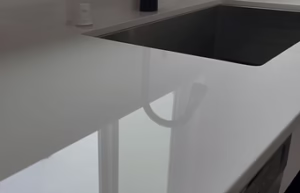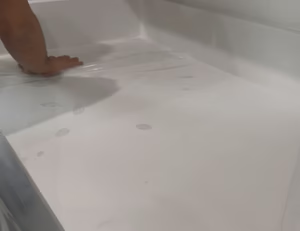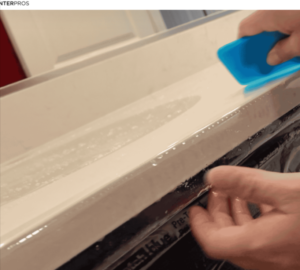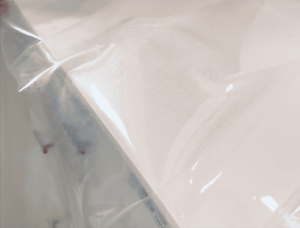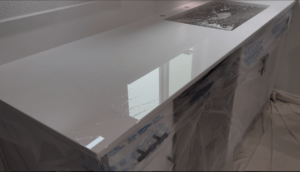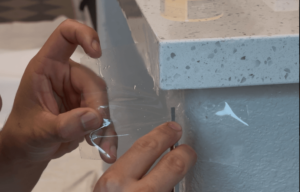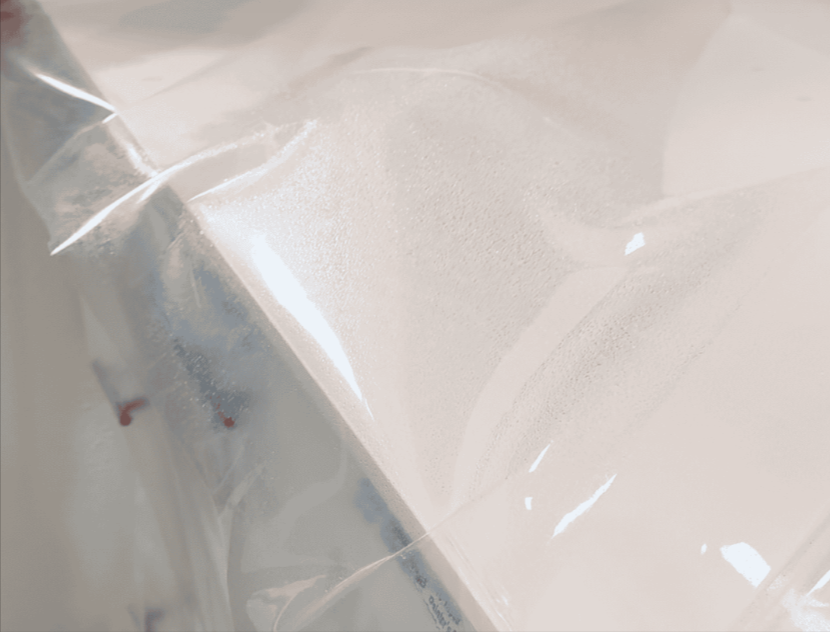
When it comes to home improvement and maintaining the longevity of your kitchen, one of the most overlooked areas of concern is countertop protection film. Whether you’re dealing with granite, marble, quartz, or any other material, your countertops are constantly exposed to potential harm from everyday activities. From accidental spills to scratches and stains, maintaining the pristine condition of your kitchen countertops can be a challenge.
One effective way to safeguard your surfaces from damage is through the use of surface protection film, commonly known as countertop protection film. This simple yet effective solution helps prevent scratches, stains, and other types of damage that can occur over time, ensuring your countertops remain beautiful and functional for years to come.
In this ultimate guide, we’ll explore everything you need to know about countertop protection film. From understanding what it is, its benefits, how to apply it, to the best types available, this guide will help you make an informed decision on whether surface protection film is the right choice for your kitchen.
What is Countertop Protection Film?
Countertop protection film is a specialized adhesive film designed to protect the surface of countertops from scratches, stains, spills, and other potential damage. The film is typically made from durable, high-quality plastic materials that are strong enough to absorb impact, resist damage, and provide an invisible protective layer. It acts as a shield for your countertops without altering the appearance of the surface beneath.
Countertop protection film comes in various forms and can be used on a range of countertop materials, including granite, quartz, marble, laminate, and solid surface countertops. It can be particularly beneficial for high-traffic areas or new kitchens where you want to preserve the surfaces and keep them looking like new for as long as possible.
Why Should You Use Countertop Protection Films?
There are several compelling reasons why homeowners, contractors, and kitchen designers recommend using surface protection films for countertops. Below are some of the key advantages:
1. Prevents Scratches and Scuffs
The most common type of damage to countertops is surface scratches and scuffs caused by daily activities like chopping, cutting, or placing objects onto the counter. These scratches can quickly accumulate, diminishing the appearance of your countertops. Using a protective film can prevent this type of damage, ensuring that your countertop surfaces remain smooth and scratch-free.
2. Resists Stains and Spills
Kitchen counters are often subject to spills from food and beverages, which can leave behind stains. Whether it’s a cup of coffee, wine, or tomato sauce, certain spills can quickly soak into the surface and leave a permanent mark. Countertop protection films act as a barrier, preventing liquids from penetrating the surface and leaving stains behind. This is especially important for porous materials like granite and marble, which can be prone to staining if not sealed properly.
3. Guards Against Heat Damage
While countertop surfaces like quartz and granite are generally heat-resistant, direct exposure to hot pots, pans, or baking sheets can still cause damage over time. Heat marks, discoloration, and dull spots can form when hot objects are placed on countertops without a protective layer. A countertop protection film can offer an extra layer of defense against heat damage, protecting your investment from long-term effects.
4. Protects from Dirt and Debris
Whether you’re cooking, cleaning, or simply using your countertops for everyday tasks, dirt and debris can build up on the surface. With countertop protection film, you can create a smooth, easy-to-clean surface that repels dirt, making maintenance a breeze. The film prevents debris from embedding into the countertop surface, allowing you to wipe away spills and dirt with minimal effort.
5. Helps Preserve Resale Value
If you’re looking to sell your home in the future, preserving the condition of your countertops is crucial. Countertops are one of the first things potential buyers notice, and having a pristine surface can increase your home’s appeal. By using a countertop protection film, you can preserve the original look of your countertops, ensuring that they remain in excellent condition when it’s time to sell.
6. Increases Durability
In addition to protecting against physical damage, countertop protection films can increase the overall durability of your surfaces. By preventing scratches, stains, and heat damage, the film helps to prolong the lifespan of your countertops, keeping them looking new for years. This is particularly important for countertops in high-traffic areas like kitchens and bathrooms, where wear and tear are more common.
How to Apply Countertop Protection Film
Applying countertop protection film is a simple process that can be done by most homeowners themselves. Here’s a step-by-step guide on how to apply surface protection film to your kitchen countertops:
Step 1: Clean the Surface Thoroughly
Before applying any film, it’s important to clean the countertop surface thoroughly to remove any dirt, dust, grease, or stains. Use a mild cleaning solution and a soft cloth to wipe down the surface. Make sure the countertop is completely dry before proceeding with the next step.
Step 2: Measure and Cut the Film
Once your surface is clean and dry, measure the dimensions of the countertop you wish to cover. Most protection films come in rolls, and you’ll need to cut the film to fit your specific countertop area. Use a ruler and a sharp utility knife to ensure precise cuts.
Step 3: Peel and Stick the Film
Peel off the backing of the protection film and carefully apply it to the countertop surface. Start from one corner and work your way across the surface, smoothing out any air bubbles as you go. Make sure the film is applied evenly and free of wrinkles.
Step 4: Trim Excess Film
Once the film is fully applied, use the utility knife to trim any excess material along the edges of the countertop. Be careful not to cut into the countertop surface.
Step 5: Smooth and Secure the Film
After trimming, go over the film one more time with a soft cloth or a squeegee to ensure that it’s properly secured and there are no air pockets.
Types of Countertop Protection Films
There are different types of countertop protection films available on the market, each designed to meet specific needs. Here are the most common options:
1. Adhesive Films
Adhesive films are the most popular choice for protecting countertops. They come with a sticky backing that sticks directly to the surface of your countertop. These films are easy to apply and remove without leaving any residue. They are available in a variety of materials, including transparent plastic, frosted, and patterned films.
2. Non-Adhesive Films
Non-adhesive protection films are designed to sit on top of the countertop without adhering to the surface. These films are typically used for short-term protection during construction or renovation projects. They can be easily removed and repositioned as needed, making them a good option for temporary protection.
3. UV-Resistant Films
UV-resistant countertop protection films are specifically designed to protect against the sun’s harmful UV rays. These films prevent fading and discoloration caused by exposure to sunlight, making them an ideal option for countertops that are frequently exposed to natural light.
4. Scratch-Resistant Films
For high-traffic areas where scratches are a concern, scratch-resistant films offer additional protection. These films are designed to withstand impact and resist the abrasions that typically occur during everyday use, keeping your countertops looking brand new.
How to Maintain and Care for Countertop Protection Film
Maintaining your countertop protection film is simple and requires minimal effort. Here are a few tips for ensuring your film stays in good condition:
- Wipe Spills Immediately: Even though the film protects your countertop from stains, it’s still a good idea to wipe up spills as soon as they occur to prevent any damage.
- Clean with Mild Solutions: To keep the film in optimal condition, clean it regularly with a gentle, non-abrasive cleaner. Avoid harsh chemicals that can damage the film.
- Avoid Sharp Objects: While the film provides protection, it’s still best to avoid cutting or scraping directly on it. Always use cutting boards and trivets to prevent scratches.
Final Thoughts: Is Countertop Protection Film Right for You?
If you’re looking for a way to extend the life of your countertops and maintain their pristine condition, countertop protection film is a smart investment. It’s an affordable, easy-to-apply solution that can prevent a variety of damages, including scratches, stains, and heat exposure. Whether you have a busy family kitchen, a modern bathroom, or a commercial space, this protective layer ensures your surfaces stay in top shape for years to come.
By following the tips provided in this guide, you’ll be able to make an informed decision on whether countertop protection film is the right choice for your home. If you’re unsure which type of film best suits your needs, consult with a professional or explore different options to find the best solution for your countertops.
FAQs
How long does countertop protection film last?
Countertop protection film can last anywhere from several months to a few years, depending on usage and the quality of the film.
Can I use countertop protection film on all types of countertops?
Yes, countertop protection films are compatible with various materials like granite, quartz, marble, laminate, and solid surface countertops.
Is it difficult to apply countertop protection films?
Not at all! Applying countertop protection film is a simple process that most homeowners can handle themselves.
Can countertop protection film be removed?
Yes, most films can be easily removed without leaving any residue behind, allowing you to replace or update the film as needed.
Does the film alter the appearance of my countertop?
High-quality countertop protection films are designed to be transparent and unobtrusive, ensuring they do not alter the appearance of your countertop.

